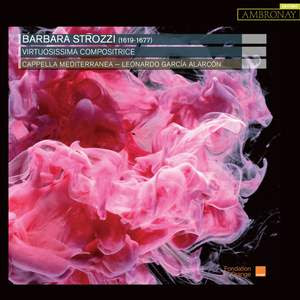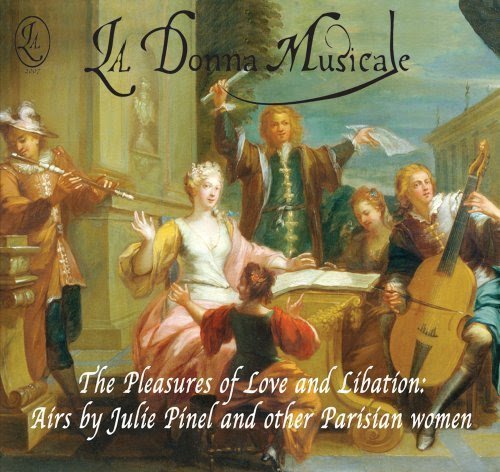Program: #20-29 Air Date: Jul 06, 2020
To listen to this show, you must first LOG IN. If you have already logged in, but you are still seeing this message, please SUBSCRIBE or UPGRADE your subscriber level today.
More music by women composers (secular this time), including Barbara Strozzi, Francesca Caccini, and Julie Pinel.
I. Heroines of Love and Loss: Female Composers and classical heroines of the 17th Century (Ruby Hughes, s./Mime Yamahiro Brinkmann, ce/Jonas Nordberg, lute, theorbo) BIS CD 2248.

D. James Ross
| 1 | Toccata Arpeggiata, Composed By – Giovanni Kapsberger* | 2:31 |
| 2 | Oh! Lead Me To Some Peaceful Gloom, Composed By – Henry Purcell | 3:53 |
| 3 | Cello Sonata In G Minor, RV 42: I. Preludio, Composed By – Antonio Vivaldi | 4:01 |
| 4 | Venus' Birds, Composed By – John Bennet | 3:15 |
| 5 | Cello Sonata In G Minor, RV 42: II. Allemanda, Composed By – Antonio Vivaldi | 3:40 |
| 6 | L'Eraclito Amoroso, Composed By – Barbara Strozzi | 7:21 |
| 7 | Ciaccona, Composed By – Alessandro Piccinini | 2:44 |
| 8 | Occhi Io Vissi Di Voi, Composed By – Claudia Sessa* | 2:03 |
| 9 | The Willow Song, Composed By – Anonymous | 3:14 |
| 10 | Lasciatemi Qui Solo, Composed By – Francesca Caccini | 7:20 |
| 11 | Lamento: Lagrime Mie, Composed By – Barbara Strozzi | 7:49 |
| 12 | Cello Sonata In G Minor, RV 42: III. Sarabanda, Composed By – Antonio Vivaldi | 4:36 |
| 13 | Cello Sonata In G Minor, RV 42: IV. Giga, Composed By – Antonio Vivaldi | 3:21 |
| 14 | O Magnum Mysterium, Composed By – Lucrezia Vizzana* | 3:18 |
| 15 | Dido's Lament, Composed By – Henry Purcell | 4:56 |
| 16 | O Death, Rock Me Asleep, Composed By – Anonymous |
II. Barbara Strozzi: Virtuosissima compositrice (Cappella Mediterranea/Leonardo García Alarcón). Ambronay CD AMY 020.

All these qualities are vividly demonstrated in these beautiful, carefully considered performances by Leonardo García Alarcón and his group Cappella Mediterranea. The programme is designed to offer a sampling of Strozzi's musical development, from polyphonic madrigals to accompanied monody and beyond; a couple of items by Monteverdi, and one by Sigismondo d'India, are added to the mixture in order to suggest, as Alarcón explains in his booklet notes, a Venetian musical evening. His players and singers all perform superbly, the star in my view being the soprano Mariana Flores for her stunning rendition of the monumental lament over an ostinato bass, "Che si può fare" from Strozzi's "Arie a voce sola" of 1664 - a spellbinding performance that combines deep feeling with infinite delicacy. The instrumental accompaniments are beautifully arranged and played, with lovely improvised ornamentation from the cornett among others, although I for one could have done without the percussion intrusions in Monteverdi's madrigal "Hor che 'l ciel e la terra" - the great master's music already expresses vividly the poet's inner turmoil and fury at the words "Guerra è il mio stato", and there is no need for anyone to bang on a drum to prove the point. In fact percussion is used again later on, in Strozzi's "Vecchio amante", but here it works much better, especially since trumpets and drums are actually mentioned in the text.
The disc is well documented and attractively presented; the booklet includes all the Italian texts with translations into English and French, a short but fascinating biography of this extraordinary composer, as well as enlightening comments by the conductor and some atmospheric photos of the musicians and recording sessions.
There are a number of recordings of Barbara Strozzi's music available, but this one from Alarcón and Cappella Mediterranea is surely among the very best. In particular, unlike some of the other discs which concentrate on a single genre or opus number, it presents music from different stages of her life - and, what is more, in the context of works by some of her contemporaries. The performances from this very fine early music group are brilliant, thoughtful and deeply committed, very much in the way the music deserves. Existing Strozzi fans need not hesitate, while baroque enthusiasts who are not yet familiar with her music will find this CD a fascinating, indeed mesmerising, introduction to the work of a bold and original genius.
Claudio Monteverdi (1567 - 1643):
1 Hor che'l ciel e la terra e'l vento tace, SV 147 08:22
Barbara Strozzi (1619 - 1677):
2 Diporti di Euterpe, overo cantate e ariette a voce sola Op. 7: Lagrime mie 08:57
3 Il primo libro de madrigali, Op. 1: Priego ad amore 03:42
Sigismondo d'India (1582 - 1629):
4 Il terzo libro de madrigali: Dispietata pietate 02:38
Barbara Strozzi (1619 - 1677):
5 Arie a voce sola, Op. 8: Che si può fare 12:11
6 Il primo libro de madrigali, Op. 1: Silentio nocivo 04:51
7 Il primo libro de madrigali, Op. 1: Vecchio amante 05:26
8 Il primo libro de madrigali, Op. 1: L’usignuolo 04:23
Claudio Monteverdi (1567 - 1643):
9 Sì ch'io vorrei morire hora ch'io bacio amore, SV 89 02:59
Barbara Strozzi (1619 - 1677):
10 L'amante modesto 06:29
Total Runtime 59:58
III. The Pleasures of Love and Libation: Airs by Julie Pinel and other Parisian Women (La Donna Musicale) La Donna Musicale CD LA 07103.

Julie Pinel's chansons are playful, flirtacious, witty, and above all pleasurable. The first track on this CD, "Rossignols vous chantez" (Nightingales, you sing...) sets the tenor for the whole performance; I've heard any number of Baroque odes to nightingales, and Pinel's is both the most expressive and the most bird-like in its recorder arpeggios. All the lyrics are of course in French, but English translations are provided. The instrumental pieces include a frolicksome "Rigaudon" for harpsichord and an well-crafted Sonata in D minor for violin and continuo.
La Donna Musicale has also released recordings of music by two other women composers of the Baroque era, which, perhaps unexpectedly for many listeners, was a lot more receptive to and supportive of women in music than the later Romantic era would be. One of the recordings is entirely devoted to Ana Bon, an Italian who had quite a glamorous long career as a singer chiefly of her own music. Then there are also two CDs of "The Seven Psalms of David", composed by Antonia Padoani Bembo.
1 Rossignol Vous Chantez
2 Boccage Frais Aimable Solitude
3 Mlle. de Bocquet: Préludes Marquant Les Cadences: Prélude
4 Préludes Marquant Les Cadences: Allemande
5 Echos Indiscrets Taisez Vous
6 Mlle. Herault: Bergères, Voulez-Vous M'en Croire
7 Le Printemps: Cantatille: Recitatif
8 Le Printemps: Cantatille: Air
9 Le Printemps: Cantatille: Recitatif
10 Le Printemps: Cantatille: Air
11 Scène Pastorale
12 Porquoy Le Berger Qui M’engage
13 Mlle de Herville: Vous Partez, Belle Iris
14 Mlle. Denis: Armons-Nous
15 Mlle. B***: Iris, Contentons Nos Désirs
16 Elisabeth Jacquet de la Guerre: Rigaudon
17 Violin Sonata in D minor: Presto
18 Violin Sonata in D minor: Aria
19 Violin Sonata in D minor: Presto
20 Mlle. Bataille: Craignez L'amour Et Sa Colère
21 Mlle. ***: Aux Plus Heureux Amants Mon Fort Doit Faire Envie
Composer Info
Giovanni Girolamo Kapsberger (c.1580 – January 17, 1651), Henry Purcell (1659-1695), Antonio Vivaldi (1678-1741), John Bennet (c. 1575 - c. 1614), Barbara Strozzi (1619-1677), Claudia Sessa, Francesca Caccini (1587 – after 1641), Lucrezia Orsina Vizzana, Claudio Monteverdi (1567 - 1643), Sigismondo d'India (1582 - 1629), Julie Pinel (fl. 1737), Mlle. de Bocquet, Mlle. Herault, Mlle de Herville, Mlle. Denis, Mlle. B***, Elisabeth Jacquet de la Guerre, Mlle. Bataille, Mlle. ***
CD Info
BIS CD 2248, Ambronay CD AMY 020, CD LA 07103